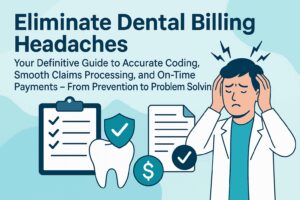
Top Resources for Dentists: Our 5 Picks for Oral Surgery Practices

From tackling complex insurance claims to mastering the latest in surgical dressing and equipment installation, the need for comprehensive support tools cannot be overstated. These resources not only pave the way for smoother operations but also ensure compliance with the latest healthcare standards, making them indispensable in today’s competitive environment.
This article will explore our top picks for resources that cover essential aspects of running a successful oral surgery practice. We delve into the realms of business planning, advanced billing and insurance claim support, professional development, marketing strategies, and the efficient use of technology. Additionally, insights into effective recruiting, employee training, and navigating legal and financial advisories will be provided. By leveraging these resources, dentists can not only streamline their practice’s operations but also heighten their focus on delivering exceptional patient care.
1. Business and Practice Management Consultancies
Tailored Services for Oral Surgery Practices
Oral surgery practices face unique challenges that require specialized management solutions. Consulting firms like Levin Group and OMS Consulting Firm offer tailored services that transform oral surgery practices into efficient, high-performing businesses. Levin Group, for example, has developed systems based on extensive data to increase production and streamline operations, specifically for oral surgery practices. OMS Consulting Firm provides a full-scope of services, from financial management to practice development, all customized to meet the specific needs of oral and maxillofacial surgery practices.
Success Stories: Growth and Financial Gains
The implementation of proven systems by consulting firms has led to significant financial gains and practice growth for many oral surgery practices. Levin Group reports increases in production by 15–25% and lifetime practice revenues by $8–10 million over 20 years. Similarly, clients of OMS Consulting Firm have seen immediate improvements in practice processes and substantial revenue growth, as evidenced by testimonials from satisfied clients like Dr. Michael Barbick and Dr. Jason Margolis.
Exploring Options for Practice Expansion and Operational Efficiency
To further enhance operational efficiency and explore expansion opportunities, oral surgery practices can benefit from the expertise of consulting firms. Levin Group offers insights into increasing implant production by 30% and achieving financial independence 8–10 years earlier, which are crucial for practices looking to expand. OMS Consulting Firm emphasizes the importance of efficient insurance billing practices and team communication to support growth and maximize cash flow, ensuring that the practice remains efficient and profitable.
By partnering with specialized consulting services like One Dental Billing, oral surgery practices can streamline their billing and insurance claim processes, further enhancing their operational efficiency and focusing on patient care.
2. Advanced Billing and Insurance Claim Support
Navigating Complex Billing Systems
Oral surgery practices often deal with the complexity of submitting both medical and dental claims, necessitating a seamless insurance billing process to avoid impacting other practice operations. One effective strategy is to automate the billing process, which not only increases efficiency but also reduces the likelihood of errors and enhances the overall success margin of the dental practice. For instance, Aspire Oral Surgery experienced a significant reduction in accounts receivable from $472,281 to $238,214, a 50% decrease, after partnering with a specialized billing service. This underscores the importance of employing sophisticated billing systems or partnering with firms like One Dental Billing to handle the intricate details of insurance claims efficiently.
Reducing Errors and Enhancing Revenue
Efficient billing practices are crucial for reducing administrative costs and increasing revenue. Utilizing billing software to automate invoicing processes can significantly diminish errors and improve cash flow. Moreover, ensuring accurate documentation and verification of insurance coverage is vital. For example, verifying the procedure coverage and any limitations before performing any dental procedure can prevent denied claims and ensure proper reimbursement. Regular training and cross-training of staff on navigating insurance protocols and billing software are essential to maintain accuracy in data entry, which is critical for successful billing.
Key Rules for Successful Oral Surgery
3. Professional Development Resources
Continuing Education and Certifications
Dentists and oral surgery professionals can enhance their skills and knowledge through a variety of continuing education programs. The DAANCE Certification Program offers specialized training, focusing on anesthesia and surgery assistance, which is crucial for any oral surgery practice. Additionally, OMS Professional Staff Development Courses provide comprehensive insights into practice management, helping staff to better support their clinical teams. For those looking for flexibility, CE on Demand Self-Study Programs allow professionals to learn at their own pace, accommodating busy schedules.
Podcasts and Webinars
The dental industry benefits greatly from an array of webinars and podcasts that cover a wide range of topics. AAOMS offers live and on-demand webinars, including sessions on practice management and advanced dental techniques, ensuring practitioners are up-to-date with the latest industry standards. The “AAOMS On the Go” podcast series is another excellent resource, featuring discussions with leading oral and maxillofacial surgeons about innovations and career advice. These digital platforms provide valuable learning opportunities and insights directly from industry experts.
Networking and Professional Groups
Networking plays a pivotal role in professional development. Engaging with professional groups and attending events can lead to mentorship opportunities and career advancement. The IAOMS Podcast Series, for instance, not only delivers expert discussions but also fosters a global community of oral and maxillofacial surgeons, encouraging connections across the globe. Additionally, the wide array of speakers featured in various dental webinars allows professionals to connect with peers and leaders in specialized fields such as implantology, pediatric dentistry, and more, fostering a community of continuous learning and professional growth.
By leveraging these resources, dental professionals can stay at the forefront of oral health care, ensuring they provide the best possible service to their patients and keep their practices thriving.
4. Marketing and Patient Acquisition Strategies
Building an Online Presence
Oral surgery practices can significantly enhance their visibility and credibility by establishing a robust online presence. A well-maintained website serves as the cornerstone of this presence, offering essential information like services, dentist backgrounds, and contact details in an intuitive layout that is easy to navigate. Ensuring the website is mobile-responsive allows patients to easily search and schedule appointments from their smartphones. Additionally, incorporating patient testimonials and before-and-after images can boost credibility and provide potential patients with a glimpse of expected results. To further enhance visibility, it’s crucial to optimize the website for search engines using relevant keywords and maintaining a blog with regular posts on dental health.
Social media platforms are vital for reaching a broader audience. Selecting the right platforms where the target audience spends their time, such as Instagram for a younger demographic or Facebook for a broader audience, helps in effectively leveraging social media. Regular posting, engaging with followers, and sharing valuable content like dental tips and educational articles build a community around the brand. Paid advertising on social media can also increase reach, allowing for targeted campaigns that attract new patients.
Referral Marketing Programs
Optimizing online presence to facilitate the referral process is crucial. Developing dedicated referral landing pages, streamlining access to referral forms, and showcasing compelling patient testimonials encourage general dentists to refer patients more efficiently. Implementing tracking and analytics systems helps evaluate referral volumes and the effectiveness of referral sources, using data-driven insights to optimize marketing strategies and nurture strategic alliances with high-value referring practitioners.
Patient Experience and Retention
The patient experience significantly influences both retention and acquisition. Ensuring clear and effective communication is key, with dental professionals needing to listen actively to patient concerns and explain treatments in an understandable manner. Enhancing the waiting room environment to reduce anxiety and using technology like text messaging for updates can improve the overall patient experience. Additionally, personalizing care by asking about patient preferences and offering conveniences like online appointment scheduling and digital portals for health information enhances satisfaction and loyalty.
By implementing these strategies, oral surgery practices can not only attract new patients but also retain existing ones, ultimately fostering a thriving practice. Engaging with patients through innovative online platforms and optimizing the patient experience are essential components of successful marketing and patient acquisition strategies.
5. Efficient Use of Technology
Software for Practice Management
Oral surgery practices benefit significantly from specialized software solutions like CareStack, which offers advanced imaging techniques and precise diagnostics tailored for oral surgeons. This software enhances productivity by integrating vital monitoring, patient portals, and online appointment scheduling, providing patients with convenience and personalized care. Additionally, MaxilloSoft streamlines operations by automating documentation and insurance verification, ensuring real-time patient status updates and beautifully formatted fee estimates. These systems not only save time but also increase the accuracy and efficiency of practice management.
Digital Tools for Patient Engagement
Patient engagement software has transformed interactions between dentists and patients, streamlining operations from the front office to the treatment chair. Tools like Intiveo enhance patient communication with automated appointment confirmations and reminders, reducing no-shows and fostering strong patient relationships. The integration of intraoral scanners and DEXIS IS ScanFlow software in routine hygiene visits improves patient engagement and satisfaction by providing clear, AI-enhanced images for better diagnosis and treatment planning. These digital tools are crucial for educating patients and ensuring they are well-informed about their oral health, leading to improved treatment adherence and outcomes.
Innovations in Oral Surgery Procedures
The adoption of 3D printing and CAD/CAM technologies has revolutionized oral surgery by allowing for the creation of custom surgical guides and implants, enhancing the precision and efficiency of procedures. Virtual and augmented reality technologies are increasingly being integrated into surgical planning and training, providing surgeons with detailed 3D representations of patient anatomy for better procedural outcomes. These innovations not only reduce surgical time but also minimize complications, making surgeries safer and more effective. As technology advances, oral surgery practices continue to embrace these tools to offer personalized and minimally invasive treatment options to their patients, significantly improving patient experiences and recovery times.
By leveraging these technological advancements, oral surgery practices can enhance both operational efficiency and patient care, ensuring they remain at the forefront of the dental industry.
6. Recruitment and Staff Training
Attracting Skilled Staff
Recruitment in the dental industry, especially for specialized roles like oral surgeons, requires a strategic approach to attract the right talent. Henry Schein Dental Recruitment Services offers a comprehensive solution by placing general dentists and specialists across the nation, ensuring that dental practices find the perfect match for their needs. Their dedicated team supports dental practices in navigating the complexities of recruiting by offering tailored marketing campaigns that maximize exposure to qualified candidates while maintaining confidentiality. Similarly, Tier2Tek Staffing specializes in connecting highly qualified oral surgeons with practices, emphasizing a meticulous process to ensure seamless integration and alignment with the clinic’s requirements.
In-house Training Programs
The importance of continuous professional development in dental practices cannot be overstated. The Department of Oral and Maxillofacial Surgery provides a comprehensive residency training program that includes exposure to a full scope of surgical procedures, ensuring residents are well-prepared for various specialties within oral and maxillofacial surgery. This program not only focuses on clinical skills but also emphasizes research, collaboration, and publication, fostering a well-rounded skill set that benefits both the individual and the practice.
Fostering a Positive Work Culture
Creating a positive work environment is crucial for the success and longevity of a dental practice. It’s essential to cultivate a culture where staff feel valued, heard, and have opportunities for growth. Implementing strategies such as regular team meetings, an open-door policy, and a robust feedback system can significantly enhance communication and job satisfaction among employees. Supporting work-life balance, offering flexible scheduling, and emphasizing the importance of breaks and vacations are other critical strategies that help in maintaining a healthy work culture. Additionally, investing in your team’s professional development by providing access to educational resources and growth opportunities shows a commitment to their future, which in turn can lead to increased loyalty and reduced turnover.
By focusing on these key areas—recruiting skilled staff, offering in-house training, and fostering a supportive work culture—dental practices can ensure they not only attract but also retain top talent, which is essential for providing high-quality patient care and achieving long-term success.
7. Legal and Financial Advice
Starting a Practice: Legal Considerations
When transitioning from a solo practitioner to a partnership, oral surgeons must formalize their business structure, opting for entities like C or S corporations, limited liability companies, or limited partnerships for enhanced asset protection and limited liability exposure. General partnerships are generally discouraged due to the high risk where each partner may be fully liable for business debts and obligations. It is crucial to engage experienced advisors from the outset to navigate the complex legal, financial, and risk management aspects of practice.
Before integrating new partners, existing practices should have a professional valuation to determine fair market value and establish a structured buy-in process for new partners. The Internal Revenue Service mandates that new partners must purchase their shares at a realistic price, which can often be a significant financial commitment.
Financial Planning and Management
Financial planning for oral surgeons should begin as early as residency and continue throughout their careers to accommodate the delayed start and extended debt period typical in their professional trajectory. Oral surgeons must manage complex finances, especially when owning a business, which includes handling employee benefits, tax laws, and investment strategies. OMS Partners provide specialized financial planning services to help surgeons optimize their current cash flow and manage long-term investments effectively.
For those acquiring an existing practice, it is vital to navigate the intricate financial landscape, including securing appropriate funding and insurance. OMS Partners assists with the negotiation of lending terms and insurance requirements to ensure a smooth transition and compliance with financial regulations.
Compliance with Healthcare Regulations
Compliance with healthcare regulations is a critical aspect of running an oral surgery practice. Surgeons must ensure their facilities meet state and federal requirements for general anesthesia or conscious sedation, maintain proper staffing, and adhere to strict ethical standards in patient care. Additionally, practices must comply with HIPAA regulations to protect patient information and ensure privacy.
Violations of OSHA and HIPAA regulations can lead to significant legal and financial penalties. Therefore, implementing an effective compliance plan, which may include internal audits, training, and clear communication protocols, is essential for maintaining the integrity and legality of the practice. Compliance plans should be scalable to match the size and complexity of the practice, ensuring they are both practical and effective.
By addressing these legal and financial considerations, oral surgery practices can mitigate risks, enhance operational efficiency, and maintain high standards of patient care and compliance.
Conclusion
Throughout the exploration of resources crucial for enhancing operational effectiveness and patient care in oral surgery practices, this article has presented a comprehensive overview from business management to technological advancements. We’ve delved into the significance of specialized consulting, advanced billing support through One Dental Billing, and the importance of continuous professional development, alongside strategies for marketing and patient acquisition. The utilization of modern technology for patient engagement and management, vital recruitment and training practices, and the adherence to legal and financial advisories have been elaborated to ensure practices can thrive in a competitive landscape.
Central to optimizing the efficiency of these operations is the integration of sophisticated billing solutions, as exemplified by our partnership with One Dental Billing. Their expertise in navigating the complex realm of dental and medical claims is indispensable for practices aiming to minimize administrative burdens and dedicate more resources to patient care. By focusing on the resources and strategies discussed, oral surgery practices are well-positioned to elevate their service, ensure compliance, and foster growth, ultimately contributing to the advancement of oral healthcare services.
FAQs
1. How many Oral and Maxillofacial Surgery (OMFS) programs are available in the United States?
There are 101 OMFS programs in the United States. Some of these programs offer a certificate, while others may include an M.D. degree as part of the residency program.
2. Which institutions are considered the top schools for studying oral surgery?
The top colleges for Oral/Maxillofacial Surgery in the U.S. as of 2024 include:
- University of Illinois Chicago
- Case Western Reserve University
- Nova Southeastern University
- University of Minnesota-Twin Cities
- University at Buffalo
- The University of Texas Health Science Center at Houston
- University of Southern California
3. What are some tips for preparing for oral surgery?
To ensure you are ready for oral surgery, follow these guidelines:
- Wear loose, comfortable clothing and choose a sleeveless or short-sleeved shirt.
- Remove contact lenses, jewelry, and watches.
- Opt for flat-soled shoes that provide ankle support.
- Do not wear fingernail polish.
- Refrain from consuming alcohol and smoking for at least 24 hours prior to the surgery.
Contact Us
Phone: 908-357-1515
111 Town Square Pl, Suite 1203 Jersey City, NJ 07310












